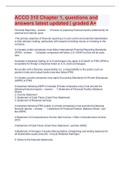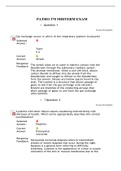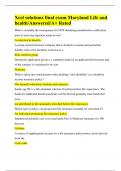INTERNATIONAL COMMERCIAL LAW — literature
Week 1
Introduction, history and sources, conflict of law
Commercial law is concerned with transactions between professionals. This definition includes:
● Institutional law, law of corporations and partnerships and the law governing the
establishment and capital adequacy of financial enterprises.
● Consumer law
● Public law
Transnational commercial law; this phrase is used to denote that set of private law principles and
rules which governs international commercial transactions and is common to legal systems generally
or to a significant number of legal systems. In order to avoid confusion there can be three usages of
transnational law:
1) As a general description of the legal regime of an international commercial transaction
2) As a label for the factual uniformity or similarity in contract laws
3) As a term to denote international sources of commercial law
Lex mercatoria: we define it as that part of transnational commercial law which consist of unwritten
customs and usages of merchants (gewoonterecht en verkeersopvattingen).
Commercial codes in the EU tend to be rather fragmented in character and to embody only a small
part of what is considered to constitute commercial law.
History ⇒ medieval law merchant:
● Objectivity
● Universality
● Reciprocity of rights
● Participatory adjudication
● Integration
● Growth
Sources of national commercial law:
● Contract
Underpins all commercial transactions, and sometimes party autonomy. Contractual terms may be
expressed or implied.
● Usage
The observance of commercial practice from a sense of obligation.
● Suppletive rules of common law
Court decisions where a deal is not covered by the party’s agreement of usages.
● Domestic legislation
Rules of commercial law prescribed by legislation.
Sources of international commercial law:
● International trade usage
● International and regional instruments
,INTERNATIONAL COMMERCIAL LAW — literature
○ Instruments intended to become legally binding.
○ Facultative instruments
● Judicial or legislative parallelism
○ State sovereignty
○ State involvement in commercial transactions
● Trade-terms promulgated by international organizations.
● Standard term contracts
● Restatements
● General principles
To become a binding usage a practice needs to be adopted from a sense of binding obligation. It
derives their force from external criteria of recognition , and conformity.
Contracts: party autonomy is considered as of crucial importance for the proper functioning of
international business transactions.
Contract choice-of-law arise in three contexts:
● Validity
● Interpretation
● Mode of performance
There are three issues of significant relevance for parties to international business transactions.
1) The question whether party autonomy regarding the determination off the applicable law is
unfettered in the sense that parties are free to choose any law or whether they are limited
to selecting one which has a relation with the transaction.
2) The question whether the parties may only choose the law of a country or whether they may
also for the applicability of a non-national body of rules of law, such as lex Mercatorian.
3) The third issue is what law governs the existence and the validity of consent as to the choice.
Lex fori (recht van het forum), road map ⇒ which public international law:
1) Which forum has jurisdiction?
a) Qualification/scope
b) Application of appropriate law
2) Which law to apply
a) Qualification/scope
b) Application of appropriate rule
3) Recognition and enforcement
Private international law, jurisdiction
On harmonious system of international civil procedure that guarantees the same degree of efficiency
and consistency in the transborder context that system have achieved domestically has to be based
on seven pillars:
● Grounds for the courts
○ Competence that considers both the plaintiffs and the defendants’ legitimate
expectations
○ Independence and impartiality of the court
, INTERNATIONAL COMMERCIAL LAW — literature
○ Fairness and the guarantee to fully present one’s case.
○ Predictability of the structure of the proceedings and their administration by the
court
○ Open-mindedness
○ Expeditioness
○ Adequate enforceability of court decisions rendered abroad.
Sources:
1) Multilateral and bilateral treaties governing jurisdiction.
2) Institutions such as the EU apply the instruments of the REIO as its own internal law.
3) Autonomous domestic rules on jurisdiction, the conduct of proceedings and the recognition
and enforcement of foreign court decisions.
Immunity: customary international law and treaties provide for the immunity from jurisdiction of
states.
Restrictive theory: states are immune in respect to acts of government but not in respect of
commercial acts.
⇒ States, Heads of state are typically immune.
Jurisdiction: sources
In the original EC treaty, there was a provision that Member States should, as far as necessary, enter
into negotiations with each other with a view to securing for the benefit of their nationals the
simplification of formalities governing the reciprocal recognition and enforcement of judgements.
This demonstrates the awareness of Member States of the fact that a community based on the
freedom of movement for persons, goods, services, and capital also requires a free movement of
court decisions on matters related to the functioning of the common market.
The Brussels convention was designed as a double instrument (= it not only regulates the
recognition and enforcement of judgements but even the jurisdiction of courts). A double
instrument makes recognition and enforcement simpler as it can be assumed that the participating
States abide by the jurisdictional rules of the instrument. Also, the rules on recognition and
enforcement make it possible to eliminate certain exorbitant jurisdictional grounds favoring directly
or indirectly domestic plaintiffs at the expense of foreign defendants.
Instruments on jurisdiction:
● EU regulation (Brussels I bis)
○ EU
The Brussels I bis has an autonomous interpretation:
a. Qualification
The concept of civil and commercial matters is autonomous and independent of the corresponding
national legal concepts. Although these have civil or commercial nature, they do not fall under the
scope of the regulation:
- Family law
- Succession
- Insolvency
Week 1
Introduction, history and sources, conflict of law
Commercial law is concerned with transactions between professionals. This definition includes:
● Institutional law, law of corporations and partnerships and the law governing the
establishment and capital adequacy of financial enterprises.
● Consumer law
● Public law
Transnational commercial law; this phrase is used to denote that set of private law principles and
rules which governs international commercial transactions and is common to legal systems generally
or to a significant number of legal systems. In order to avoid confusion there can be three usages of
transnational law:
1) As a general description of the legal regime of an international commercial transaction
2) As a label for the factual uniformity or similarity in contract laws
3) As a term to denote international sources of commercial law
Lex mercatoria: we define it as that part of transnational commercial law which consist of unwritten
customs and usages of merchants (gewoonterecht en verkeersopvattingen).
Commercial codes in the EU tend to be rather fragmented in character and to embody only a small
part of what is considered to constitute commercial law.
History ⇒ medieval law merchant:
● Objectivity
● Universality
● Reciprocity of rights
● Participatory adjudication
● Integration
● Growth
Sources of national commercial law:
● Contract
Underpins all commercial transactions, and sometimes party autonomy. Contractual terms may be
expressed or implied.
● Usage
The observance of commercial practice from a sense of obligation.
● Suppletive rules of common law
Court decisions where a deal is not covered by the party’s agreement of usages.
● Domestic legislation
Rules of commercial law prescribed by legislation.
Sources of international commercial law:
● International trade usage
● International and regional instruments
,INTERNATIONAL COMMERCIAL LAW — literature
○ Instruments intended to become legally binding.
○ Facultative instruments
● Judicial or legislative parallelism
○ State sovereignty
○ State involvement in commercial transactions
● Trade-terms promulgated by international organizations.
● Standard term contracts
● Restatements
● General principles
To become a binding usage a practice needs to be adopted from a sense of binding obligation. It
derives their force from external criteria of recognition , and conformity.
Contracts: party autonomy is considered as of crucial importance for the proper functioning of
international business transactions.
Contract choice-of-law arise in three contexts:
● Validity
● Interpretation
● Mode of performance
There are three issues of significant relevance for parties to international business transactions.
1) The question whether party autonomy regarding the determination off the applicable law is
unfettered in the sense that parties are free to choose any law or whether they are limited
to selecting one which has a relation with the transaction.
2) The question whether the parties may only choose the law of a country or whether they may
also for the applicability of a non-national body of rules of law, such as lex Mercatorian.
3) The third issue is what law governs the existence and the validity of consent as to the choice.
Lex fori (recht van het forum), road map ⇒ which public international law:
1) Which forum has jurisdiction?
a) Qualification/scope
b) Application of appropriate law
2) Which law to apply
a) Qualification/scope
b) Application of appropriate rule
3) Recognition and enforcement
Private international law, jurisdiction
On harmonious system of international civil procedure that guarantees the same degree of efficiency
and consistency in the transborder context that system have achieved domestically has to be based
on seven pillars:
● Grounds for the courts
○ Competence that considers both the plaintiffs and the defendants’ legitimate
expectations
○ Independence and impartiality of the court
, INTERNATIONAL COMMERCIAL LAW — literature
○ Fairness and the guarantee to fully present one’s case.
○ Predictability of the structure of the proceedings and their administration by the
court
○ Open-mindedness
○ Expeditioness
○ Adequate enforceability of court decisions rendered abroad.
Sources:
1) Multilateral and bilateral treaties governing jurisdiction.
2) Institutions such as the EU apply the instruments of the REIO as its own internal law.
3) Autonomous domestic rules on jurisdiction, the conduct of proceedings and the recognition
and enforcement of foreign court decisions.
Immunity: customary international law and treaties provide for the immunity from jurisdiction of
states.
Restrictive theory: states are immune in respect to acts of government but not in respect of
commercial acts.
⇒ States, Heads of state are typically immune.
Jurisdiction: sources
In the original EC treaty, there was a provision that Member States should, as far as necessary, enter
into negotiations with each other with a view to securing for the benefit of their nationals the
simplification of formalities governing the reciprocal recognition and enforcement of judgements.
This demonstrates the awareness of Member States of the fact that a community based on the
freedom of movement for persons, goods, services, and capital also requires a free movement of
court decisions on matters related to the functioning of the common market.
The Brussels convention was designed as a double instrument (= it not only regulates the
recognition and enforcement of judgements but even the jurisdiction of courts). A double
instrument makes recognition and enforcement simpler as it can be assumed that the participating
States abide by the jurisdictional rules of the instrument. Also, the rules on recognition and
enforcement make it possible to eliminate certain exorbitant jurisdictional grounds favoring directly
or indirectly domestic plaintiffs at the expense of foreign defendants.
Instruments on jurisdiction:
● EU regulation (Brussels I bis)
○ EU
The Brussels I bis has an autonomous interpretation:
a. Qualification
The concept of civil and commercial matters is autonomous and independent of the corresponding
national legal concepts. Although these have civil or commercial nature, they do not fall under the
scope of the regulation:
- Family law
- Succession
- Insolvency







